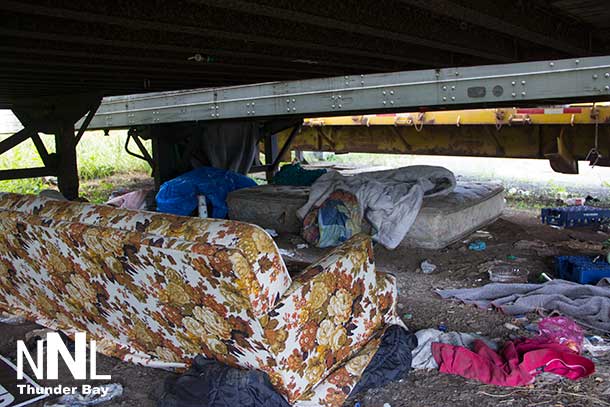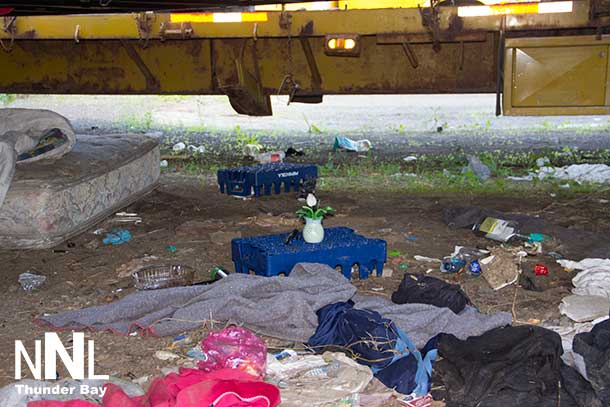
THUNDER BAY – INSIGHT – Thunder Bay politicians have continued to talk about the need to get to solve the root issues in the social problems that plague the city. Many of the problems stem from racism, addiction, homelessness, and racial profiling. The Shelter House in Thunder Bay, according to Executive Director Patty Hadju is filled nightly. The call has gone out repeatedly and most recently to help stock the shelves at the shelter.
Thunder Bay is being called the “Murder Capital of Canada”. That title hits hard at the heart of our city, and is a serious public relations disaster. The growing incidents on social media of racism in our city is creating an image of our city that hurts too. Many of the issues we face are social issues. Crime does not happen because someone is poor, or has a lower income. That would be to insult the many many hardworking people earning low wages.
We have to get deeper inside the issues, get away from stacks of paper and out from behind desks in air-conditioned offices and get out to see what is happening, and listen to solutions.
Residents are increasingly frustrated, and some seem to feel that lashing out works. Racial profiling and incidents with authorities in the United States is making world-wide news, Thunder Bay does not, yet seem to generate those kinds of headlines, but it is increasingly possible. It means the time for action is now.
The evidence of the problems are very visibly apparent across the city.

Recently, on a walking tour with an advocate and activist for change, I was toured across the city through dozens of the unofficial ‘homeless shelters’ that are across Thunder Bay. It would be simple to say that there is a problem. It is far easier to establish committees, and study the issues.
The real solutions are not going to be found in housing people in a homeless shelter. Now, with all due respect to the Rotary Shelter House on George Street in the Fort William downtown, they are doing everything that they are capable of doing, within their limited scope of resources.
Politicians, social services, and the Thunder Bay Police Service all appear to see the problems. Seeing the path forward to solutions however is harder, and is going to take real work, and it is going to take new ideas being accepted into Thunder Bay.
One of those new ideas is that the cost of doing nothing is far greater than the cost of action. As the Thunder Bay Police Services budget soars, as the cost of courts, jail, gets factored in, we are spending far more in reactionary solutions than in pro-active solutions.

Hopefully that is starting to slowly happen.
Mayor Hobbs reports to NNL that he is talking with the Mayor of Medicine Hat, Alberta where the city has solved the homeless issue. Councillor Frank Pullia has talked for sometime now on solutions. The time is ripe to stop focusing on big “built it and they will come” projects and to get focused solidly on the baseline solutions that will make Thunder Bay a better city.
Performance Indicators for City Administration and Committees
Thunder Bay City Council needs to step up and implement processes to demonstrate positive returns on the efforts of committees including the Anti-Racism Committee. Issuing green respect buttons and plastic wristbands, might look good, and likely helps, but the question of taxpayers getting value for the money spent on the committee must be examined. Putting in performance indicators is a key component of moving forward.
Once out walking the streets, you do no see a lot of street people wearing Respect buttons, or wearing Respect wristbands.
Taxpayers need to be a key part of the process moving forward. So does the federal and provincial government, and so do First Nations leaders and communities.
Protecting those most vulnerable in our society makes economic and social sense.
Thunder Bay has seen massive investments in the waterfront, a massive almost $500 million investment in the new provincial courts in the downtown Fort William neighbourhood.
The end results over time appears to be more people on the streets living in makeshift campgrounds, and milling about outside waiting and hoping for something better for their lives. We can do a lot to attract a tourist to our city, but today if they head to one of our local parks and see the evidence of addiction, Thunder Bay gets a tourism black eye.
Step Up!
We have to step up. One city councillor recently commented after being asked about a group of people living on the back step of the old OATC facility in the Fort William neighbourhood, “Seems these individuals chose to behave in a manner that got them banned from Shelter House …. Threats , abuse, inappropriate behaviour is not tolerated … We can only help those that accept our help”.
That demonstrates clearly why we have the problems we do.
The people living on the streets, with addiction issues, mental health issues, guess what? It is the abuse many have suffered and remained untreated, or under-treated that causes many of the problems they face and is why they react the way they do, with anger.
Think of it, if you were homeless, addicted, helpless wouldn’t you get angry? Wouldn’t you end up wanting to lash out at a system that appears to have simply left you behind, forgotten and uncared for?
Reports that yelling or dumping out a trash container results in being “banned” demonstrates that the system isn’t helping those who most need the help. Left on the streets to fend for themselves for months on end only reinforces the problems that cause our downtown neighbourhoods and parks to become less welcoming for visitors.
Solutions are Possible

The Crime Prevention Council is moving toward solutions, especially in the downtown Fort William neighbourhood. However for many the timeline on those solutions is likely too long to seriously help solve problems and maintain many of the businesses in the downtown. It is going to take engaging with the people on the streets, and in the businesses, not just those on committees to fully implement success.
The reality is that it has taken a long time to get to where we are. It is a situation that will take serious work and dedication to solve.
So what are workable solutions? What will solve the root causes of addiction, violence, and the social ills that impact not only Thunder Bay, but other communities?
First perhaps is getting people to a point where they are feeling safe, or at least safer. Thunder Bay, just like many other cities has a population of homeless people. Many struggle with mental health issues, issues with addiction, and issues with poverty as a result.
At the Salvation Army shelter, and at Rotary Shelter House there are some people who are not able to access those services, they are on a banned list. They are some of the people who are living in the woods, along the shore of Lake Superior, and along river banks and other places across Thunder Bay.
That means some on City Council and some in senior positions in the city need to get out from behind their desks and podiums and start putting boots on the ground and getting out to walk their city. Getting off the beaten trails, and sitting down to watch, engage and listen would be a pro-active start.
Thunder Bay does not have to re-invent the wheel
A “Housing First” approach, where homeless people with mental illness are provided with a place to live without preconditions such as sobriety or seeing a psychiatrist, coupled with intensive case management, helps to reduce alcohol-related problems, a new study has found. These interventions also improve housing stability and community functioning for this population, said lead author Dr. Vicky Stergiopoulos, psychiatrist-in-chief at St. Michael’s Hospital and a scientist in its Centre for Research on Inner City Health.
Dr. Stergiopoulos followed 378 homeless people with mental illness in Toronto, Canada’s largest and most diverse urban centre, for 24 months. Half were randomized into a Housing First program with intensive case management while the other half received treatment as usual.
There was a significant 53 per cent drop in the number of days spent experiencing alcohol-related problems among the Housing First group compared with the treatment-as-usual group. At the start of the study, participants in the Housing First group on average experienced alcohol problems on 4.3 out of 30 days. By the end of the study, this number decreased to 1.7 days. In comparison, the treatment-as-usual group experienced alcohol problems on 3.4 out of 30 days at the start of the study start, which decreased to 2.9 days by the end.
In addition, the amount of money they spent on alcohol in the previous 30 days dropped significantly. Housing First participants spent on average $62 on alcohol in the past 30 days at the start of the study, which dropped to $53 by the end of the study. However, treatment-as-usual participants increased spending from $70 to $114.
The severity of substance use fell by 28 per cent after 12 months for Housing First compared to treatment-as-usual participants, but wasn’t statistically significant at 24 months.
Although the number of Emergency Department visits and days spent in hospital did not differ significantly between the two groups, fewer Housing First participants reported one or more hospitalizations over the 24 months (70 per cent vs. 81 per cent).
The study participants were primarily men in the 40s. The most common mental health diagnoses were substance dependence or abuse (46 per cent), major depression (45 per cent), alcohol dependence of abuse (40 per cent), post-traumatic stress disorder (29 per cent) and psychotic disorder (26 per cent).
“Housing First’ is an approach to ending homelessness developed in the United States that centers on quickly moving people experiencing homelessness into independent and permanent housing and then providing additional supports and services as needed. The underlying principle is that people are better able to move forward with their lives if they are first housed.
Moving to this for Thunder Bay likely means taking new approaches. Right now street people and the chronic homeless spend their days on the streets, and their nights struggling to find shelter.
Leaving people out on their own for the day, likely reinforces the problems they face. An addict on the street will do what is needed to get the drugs that they are addicted to. A person with depression will fall deeper into depression, and likely deeper into addiction to simply numb the pain and make it through yet another day.
Getting past the talking and studying stage to the rapid action stage is something needed.
Until we do that, perhaps setting aside the motto “Superior by Nature” as our city motto might be an idea.
James Murray






